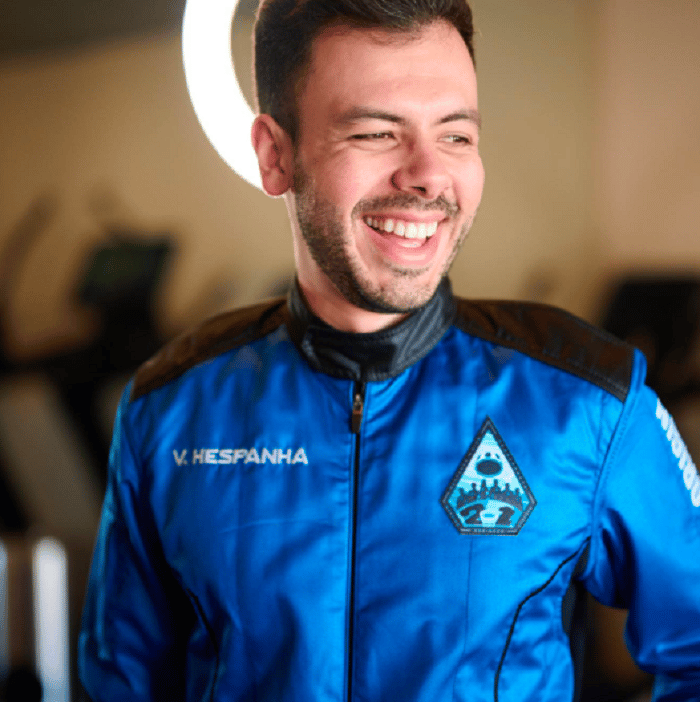
Understand the difference between the travels of Marcos Pontes and Victor Hispanha
Last Saturday (4), with the launch of Blue Origin’s fifth manned flight, civil production engineer Victor Correa Hispanha became the second Brazilian to travel into space. Before him, only former Minister of Science, Technology and Innovation Marcos Pontes had such privilege.

Both, however, can be considered pioneers. While Pontes was the first Brazilian and South American astronaut to travel outside Earth, Hispanicha holds the title of the first Brazilian space tourist.
But what sets these two designations apart after all? And more: What is the difference between one trip and the other?
Space tourists are not astronauts
In common parlance, everyone who goes into space is called cosmonauts (or their national specification, such as cosmonauts from Russia and cosmonauts from China). But in fact, there are criteria that must be evaluated in order for a space traveler to receive this rating.
Besides the US Federal Aviation Administration (FAA), there are two other government agencies authorized to grant the title of astronaut: the Department of Defense and NASA, which grant this status only to their employees.
According to Federal Aviation Administration guidelines, crew members who fly more than 80 km above the Earth’s surface can be classified as astronauts. According to this scale, passengers of Blue Origin expeditions are included, since the company’s flights go beyond the Kármán line, which is located at an altitude of 100 kilometers above sea level and is considered the frontier where outer space begins.
However, this is not the only limiting factor. The astronaut candidate must undergo extensive training approved by the Federal Aviation Administration (FAA) and “demonstrate in flight procedures important to public safety or that contribute to the safety of human space.” In addition, the person in the crew must be assigned to perform certain tasks during the flight, and not just an ordinary passenger.
The New Shepard capsule, which carries Blue Origin passengers on manned missions, is a fully self-sufficient system, so none of them need to take on pilot roles or any other activity. Thus, Hespanha and the other members of the company’s manned missions are space tourists, not astronauts.
Differences between Marcos Pontes and Victor Hispanha spaceflight
Science X Tourism. This is the fundamental difference between the Marcos Pontes and Victor Hispanha space missions.
Born in Bauru (SP), Pontes holds a degree in Aeronautical Technology from the Air Force Academy (AFA), in Pirassununga, São Paulo, and a master’s degree in Systems Engineering from the US Naval Postgraduate School, California. He officially graduated as an astronaut in 2000 after being selected by NASA to attend the two-year course of the Astronaut Training Program.

Hispanha, in turn, won its seat through a lottery organized by the Crypto Space Agency (CSA), after investing about 12,000 R$ in the purchase of three NFT (short for non-fungible token, a type of digital approved file). .
The first spaceflight of Pontes was scheduled to take place in 2001, in one of the tasks of the project to establish the International Space Station (ISS). But a series of situations ended with the Brazilian astronaut being placed at the end of NASA’s launch line for the orbiting laboratory.
He ended up going to the Russian space agency Roscosmos, which received about 10 million US dollars from Brazil for a “ride” on the Soyuz spacecraft, which took place in 2006. On this occasion, the Brazilian captured 15 kg of Brazilian space cargo. Agency (AEB), containing eight science experiments developed by universities and research centers across the country.
Between the outbound, stay and return flight, Ponte’s mission to the International Space Station, 408 kilometers from Earth, took 10 days, factoring in nearly 24 hours of travel in each section.
Hespanha’s tour on Saturday lasted ten minutes. The New Shepard rocket lifted off from the Blue Origin 1 launch site in Van Horn, West Texas, at 10:26 a.m. (GMT), 26 minutes later than scheduled.
Shortly after takeoff, the rocket’s first stage landed vertically near the launch site, followed by the RSS First Step capsule, which landed in the desert using a parachute. During the entire trip, the Brazilian and the other crew members only had to worry about taking advantage of the three minutes of near weightlessness and enjoying an unparalleled view through the windows.
Even a “simple” task like this requires a lot of preparation, both for the vehicle and equipment in general, and for the people involved (crew and the entire technical team). Before the flight, Hispanha and her adventurous companions had to undergo two days of training – not comparable even to the process of training astronauts.
they will meet
In an interview with digital appearanceA few weeks before his Blue Origin trip, Victor Hispanha expressed his desire to meet Marcos Pontes. At that time, there were no negotiations between them in this regard, but a little later, via Instagram, Hispanha revealed that the meeting was already being organized.
The citizen of Belo Horizonte wishes to express, whenever he can, all his respect to the scientific community and to astronauts in general. “I have great respect for the scientific community and the astronauts. They study a lot for this, they dedicate themselves and I greatly appreciate this effort,” the Brazilian said.
“As a space traveler, I will have the privilege of seeing the Earth from above, the darkness of the universe and the stars at close range, the curvature of the planet,” he said before launch. “So I consider myself lucky to be able to see this, but I do not consider myself an astronaut at all.”
Have you seen our new videos on Youtube? Subscribe to our channel!

“Organizer. Social media geek. General communicator. Bacon scholar. Proud pop culture trailblazer.”

